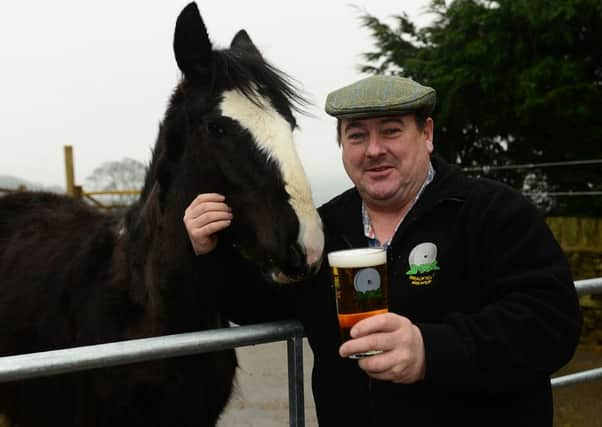Last orders for the herd as beer making proves an ideal solution


Instead of feeling bitter they had already decided to produce bitter and a whole raft of ales that has seen Bradfield Brewery become one of the area’s leading employers in this High Peaks village with a team of 23.
“We never had any intention of selling our dairy cows,” says John Gill.
Advertisement
Hide AdAdvertisement
Hide Ad“We had only just upped our numbers and we were going to continue with milk as well as building up the brewery, but I’ve always been one for gut feelings and by the time the ink had dried on the cheque we’d written took us from 90 to 120 cows the milk price had dropped; the additional time it was taking to milk didn’t sit right; and we’d put a new 8,000 litre milk tank in that there was something about that rankled with me.”
Ironically, last year John bought a brand new Case tractor, the farm’s first since 1986, at a time when the 140 acres he and wife Susan have are now populated by just 50 over-wintering sheep and a very small flock of eight Texel X ewes.
“We’d always said we’d never be able to afford a new one. We purchased it with a pasture topper to keep the grass down, but we also use it every day for moving grains for the brewery. It’s funny really, there was a time when every blade of grass counted, now it just has to look right.”
The catalyst for Bradfield Brewery came when another enterprise had suffered a downturn. For years John had run Bobcat loaders that had brought the farm a good supplementary income, but the regular work was dying off.
Advertisement
Hide AdAdvertisement
Hide Ad“When Susan and I took over the farm after her mum Eunice and dad Stanley retired we bought a Bobcat to use on the farm but I thought I would make it pay for itself by getting a few other jobs.
“Over the years the work increased and we ended up with a couple of machines. At one time the Bobcat work was the only thing bringing in any real money, but just as we had seen the writing on the wall with our milk round in earlier years I could see our Bobcat work was no longer going to be around.
“In 2003 we started looking at some other diversification and we received free consultation advice through Business Link when a chap called Chris Franklin came to see us.
“We had made some garden furniture for ourselves and had wondered whether we could start doing that for pubs, but as Chris was leaving I remember him saying that whatever our decision we should make sure it was something we liked and had an interest in.
Advertisement
Hide AdAdvertisement
Hide Ad“Well, I couldn’t honestly see myself in an apron on a wood laithe every day, that wasn’t going to hit the spot, but then our son Richard came home a couple of days later and said what about a micro brewery?
“I’d always done some home brewing and Richard had got into doing a full mash on a Sunday morning using up half the kitchen. It sounded right for us, he brewed all the beer for our daughter Lisa’s birthday party and it went down really well with everybody so we started building the brewery which, along with one or two nightmares along the way, allowed us to start brewing on April 26, 2005.”
Five years ago Bradfield Brewery extended its brewing equipment to four times the size of when John started. Production now runs to 300 barrels a week - that’s between 75,000 to 80,000 pints and more than 500 pubs take their beers regularly, plus they send beer to Enterprise Inns and Punch Taverns depots for distribution. Nearly every pub you see in their area has Bradfield Brewery beer.
In 2008 the Gills bought their own pub, the Nag’s Head, just a mile or so down the road on Stacey Bank where all their beers are just £2 a pint regardless of strength.
Advertisement
Hide AdAdvertisement
Hide Ad“It’s where the first pint of our beer was ever sold and all our six frontline beers are on all the time. We also do simple pub food like pie and peas, but it’s there mainly for the beer. Even so it gets stacked out most of the time.”
Most of John’s beers have the name ‘Farmers’ on the label and several are named after cattle breeds. There’s the Blonde, Brown Swiss and Belgian Blue. His strongest ale is the Sheffield Sixer.
He’s learned more than a thing or two about marketing in the past 11 years.
“We’ve re-branded our bitter as Farmers Ale. It works better that way for our female customers.”
THOUSANDS OF BREWS LATER
Advertisement
Hide AdAdvertisement
Hide AdBradfield Brewery expanded again last year and celebrated its 3,000th brew with a special beer called 3K.
John Gill tells of how they met their head brewer Paul Ward in August 2004.
“Paul invited us down to the Great British Beer Festival in London and we met him at the railway station in Sheffield.
“While we were down there he picked his beer where he was brewing at the time at Kelham Island won the championship.
“I offered him the job there and then and we’ve never looked back.”
The South Yorkshire brewery has its own wagon driving horses - three Shires and a Percheron.